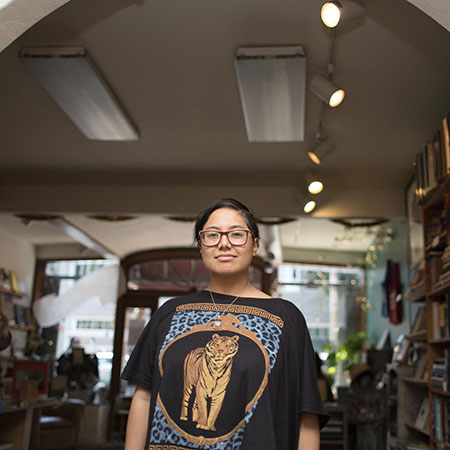Dorothy R. Santos has so many achievements they’re almost too many to count, according to the graduate programs coordinator in the UC Santa Cruz Film and Digital Media Department.
Santos, a doctoral candidate in film and digital media, received the department’s 2020–21 Outstanding Teaching Assistant Award and is one of the Yerba Buena Center for the Arts 100 in 2021 for “extraordinary commitment to building sustainable, equitable, and regenerative communities.”
She cofounded the collaborative and politically engaged arts platform REFRESH and is the executive director of Processing Foundation, a nonprofit committed to the visual arts, software literacy, accessibility, and inclusion. She is currently a lecturer at San Jose State University in the Digital Media Art program.
Santos is a recipient of the Eugene V. Cota-Robles Fellowship, which pays her tuition and provides her with a stipend for her doctoral studies.
“I am eternally grateful for that,” she said. “I would not have pursued graduate work if not for that fellowship.”
Born and raised in San Francisco’s Mission District in a Filipino immigrant family, Santos, 42, has always looked at life through a global, transnational lens. Santos was very nearly born in the Philippines, as her mother moved to the U.S. when she was eight months pregnant with her.
Though her parents didn’t teach her to speak Tagalog, she learned to understand it along with learning and speaking English. When she was 4, she learned Spanish from the family’s next-door neighbor she lovingly called Mama Miriam.
Santos received her master’s degree in visual and critical studies from the California College of the Arts and earned bachelor’s degrees in philosophy and psychology from the University of San Francisco. She also spent 14 years working in biotech.
Now, at UC Santa Cruz, she studies the way the human voice is trained and mediated as part of her research in feminist media histories, critical medical anthropology, tech, race, and ethics.
She finds it fascinating how certain types of Western and Eurocentric accents are considered authoritative. For example, she researched the desegregation of Bell System telephone operators in the 1960s and '70s and how Black women from the South suffered from racial discrimination due to their accents and socioeconomic status, she said.
She recalls her mother trying to tone down her Filipino accent when she and her mother once worked for the same company.
“It hurt and frustrated me,” she said.
Santos’s dissertation focuses on voice recognition and assistive technologies. She hopes to look at how the technology might be made more accessible and inclusive in the future.
Santos is also creating an artwork that responds to her research. It will include a limited-edition book tentatively titled, Do No Harm, that subverts scientific documentation and uses the format of a choose-your-own adventure game. People who purchase the book will have an option to become a part of a durational participatory work.
“I’m not collecting data for surveillance purposes,” she said. “It’s part performance piece. Participants are free to see where it takes them in the end.”
She has appreciated the opportunities offered her at UC Santa Cruz, including becoming a graduate fellow for the Science & Justice Research Center. She participated in a research cluster called Theorizing Race After Race. Her work with the group examined how statistical modeling was done during the pandemic and how data from the media compared with data put out by other institutions. She worked with Professor Jaime Morse in Sociology and undergraduate fellow Aitanna Parker (Stevenson '20, critical race and ethnic studies; technology and information management) on this research, which resulted in a dialogue with journalist Alexis Madrigal, a staff writer at The Atlantic and a cofounder of The COVID Tracking Project.
“I wouldn’t have gotten that opportunity anywhere else,” Santos said, adding it was great to work alongside social scientists and sociologists.
After earning her doctoral degree, she would like to continue teaching, working with Processing Foundation, and advocating for artists and open-source software communities.
“I’m open to opportunities that might come my way,” she said.



